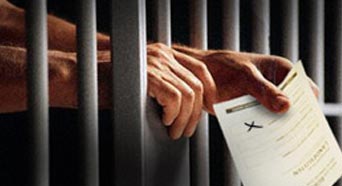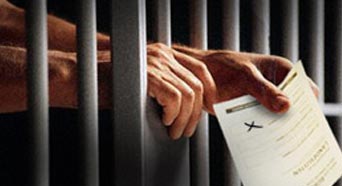 Britain has a blanket ban on prisoners voting. That meant that 73,000 people were disenfranchised in last year’s election.
Britain has a blanket ban on prisoners voting. That meant that 73,000 people were disenfranchised in last year’s election.
This is rather mysterious to me. What is it about a prison sentence that makes you unfit to vote? You remain a citizen, and you still have rights, including democratic ones. Your bank accounts or driving license aren’t taken from you, you still have to pay tax on any savings, so why the right to vote?
Britain is the only country in Western Europe that has such a ban on voting. Ireland lifted a ban in 2006 and prisoners can vote by post. Germany actively encourages prisoners to vote as a way of participating in society from prison, although it excludes those convicted of electoral fraud. Most European countries have a system that allows most prisoners to vote, with certain exceptions. Greece bans those with life sentences, Poland, Italy and France don’t allow votes for those serving time for ‘serious crimes’. There is a spate of tabloid headlines at the moment about murderers and rapists getting the vote, but the rest of Europe is handling this perfectly well.
Besides, why shouldn’t they vote? If you believe in one-person one-vote, would you argue that prisoners have somehow ceased to be people? Are they unfit or irresponsible? Dr Peter Selby, a former bishop to the prisons, puts it well:
Denying convicted prisoners the right to vote serves no purpose of deterrence or reform. What it does is to state in the clearest terms society’s belief that once convicted you are a non-person, one who should have no say in how our society is to develop, whose opinion is to count for nothing. It is making someone an “outlaw”, and as such has no place in expressing a civilised attitude towards those in prison.
The debate is back in the news this week because MPs voted yesterday to keep the ban. It was a backbench motion designed to re-assert parliament’s right to make a decision on the matter, since the European Court of Human Rights declared the ban illegal in 2004. No, we appear to be claiming, it is lawful because we say it is. But the ruling wasn’t passed down arbitrarily from some cabal of European judges – it was the result of a court case brought by a prisoner serving a sentence for manslaugher, John Hirst, who demanded his right to vote and couldn’t get a hearing in the UK.
The trouble is, the debate now is all about the EU court and it’s right to overrule British law. As a matter of sovereignty we want to overturn their ruling and keep the ban. Anything less would infuriate the Eurosceptics and nationalists. But this debate shouldn’t be about the EU. It should be about the 73,ooo people who are denied the right to vote for no good reason.
Part of the problem is of course that prisoners are marginalised as it is. They aren’t free to campaign and lobby government. They are easily ignored, and many people would actually prefer it that way. But it matters, all the more so because it is a section of society that lacks a voice.
To put this in an international context, Britain isn’t the only country thinking this stuff through. This is far worse in the US, where many states strip their citizens of the right to vote for life, even after a sentence is served. Because of these laws, 13% of young black males are ineligible to vote. It’s a state matter however, and Maine and Vermont allow prisoners to vote. Canada lifted its ban in 2002.
In 2004 South Africa ruled that preventing prisoners from voting was unconstitutional and lifted the ban. Parliament may want to consider the wisdom of Judge Albie Sachs of the South African Constitutional Court:
A government that restricts the franchise to a select portion of citizens is a government that weakens its ability to function as the legitimate representative of the excluded citizens, jeopardizes its claims to representative democracy, and erodes the basis of its right to convict and punish law-breakers.
- For more, see the Prison Reform Trust

My thoughts exactly. We need an explanation as to why prisoners don’t have a right to vote. It’s not obvious why they don’t. The only reason I can think of is that prisoners are the most likely people to vote against the powers that be.
As a Dutchman I lived 17 years in the UK as a legal, tax-paying citizen. Before I lived in Germany and now in Italy. I have never had the right to vote in any national elections in my life, despite having co-founded a political party, the Green Party of Northern Ireland. Now that is unjust. Democracy does not exist.
Thanks for sharing. I like this one Jeremy.